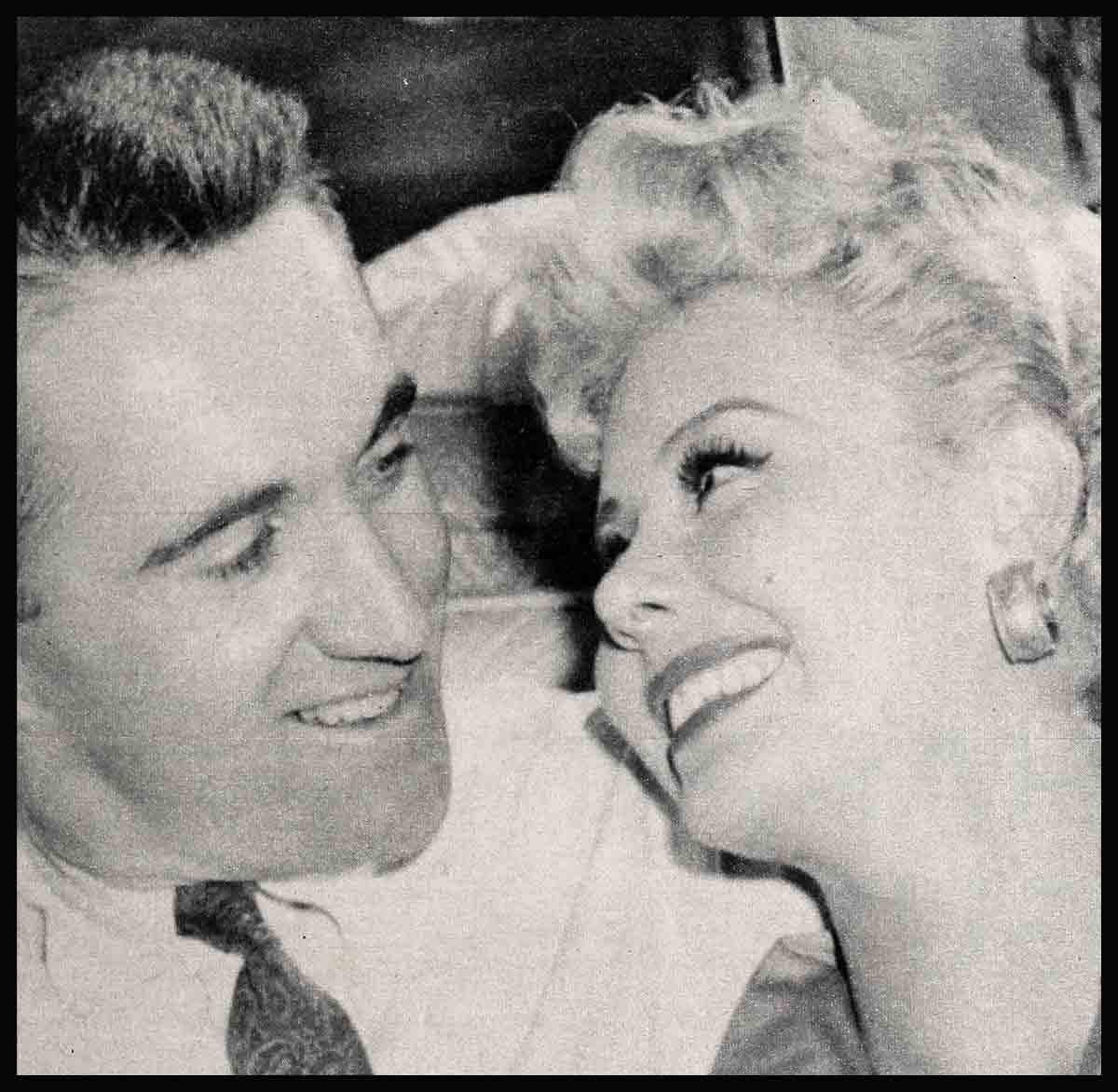
The Bride Vanished—Mitzi Gaynor
When does a bride become a genuine wife?
“Maybe not until the second year of marriage!” says vivacious, volatile Mitzi Gaynor, who has lived and learned so much since she married public-relations expert Jack Bean in November, 1954.
Then a brand-new bride, love-struck Mitzi told everyone, “Jack is everything I ever wanted for a husband. . . . I didn’t realize my own emptiness until I fell in love with him. I found for the first time warmth, security, a man to lean on and listen to, and the joy of loving and being loved.”
But now, in her second year of wedded bliss, the mirthful Mrs. Bean knows that love is far more than a dream, for she has changed in some important ways. No longer is she painfully immature and over-sensitive. “I’m glad I’m finally growing up,” she says earnestly. Then she adds with a laugh, “If I weren’t, Jack wouldn’t like me, and I’d be miserable!”
During the first months of marriage, Mitzi was typically bouncy and blissful, but also often bewildered. Wanting more than anything to make Jack deliriously happy, she was haunted by the fear that she’d break the magic rules for wives. “I tried to become my idea of an ideal wife overnight,” she confesses. Now, however, she realizes that she actually didn’t know how to face facts, or be her real self. Jack had long-since been convinced that Mitzi could accomplish whatever she attempted. Consequently, he was surprised to learn that she expected him to react with the utmost enthusiasm to everything she did at home—otherwise, she would be hurt, feeling she had failed.
As soon as the newlyweds had returned from their whirlwind honeymoon in New York, domestic-minded Mitzi eagerly started to put into effect all the theories she had learned. First off, she had read that a husband wants an immaculate home—which is just what their furnished apartment in Hollywood wasn’t. The people before them had left it coated with dust, the woodwork was soiled, the windows unwashed, the floors unwaxed. So, the first day Jack returned to his office, Mitzi plunged full-steam ahead into an eight-hour campaign of scrubbing and polishing. She ruined her nails, bruised her knees, and generally exhausted herself. Still it was fun—a challenge—because it was such a switch from all her singing and dancing in glamorous movies. Then, too, she was determined to prove herself a model housewife.
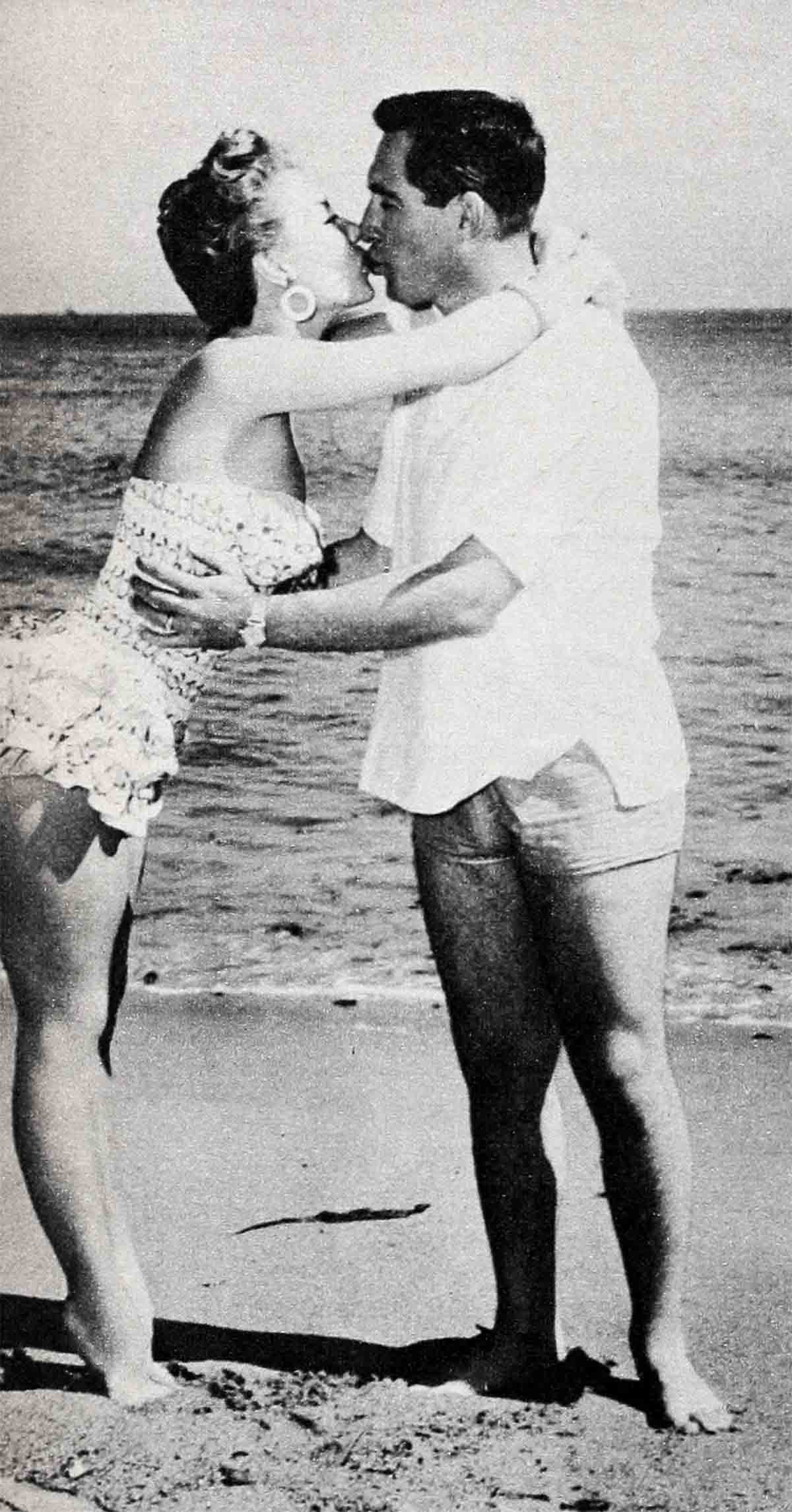
That night, when Jack arrived home for dinner, Mitzi was exhausted, but triumphant. But, to her complete dismay, Jack didn’t get the least bit excited over the results of her industry. After kissing her hello, he casually emptied his pockets and tossed the contents on a table. Completely shocked, Mitzi asked didn’t he notice the difference. He admitted the spotless effect was nice, and let it go at that. Crushed by this rebuff, Mitzi burst into tears and grew hysterical. They finally had their dinner several hours later, after Jack had consoled her and had tenderly tried to make her understand that no husband considers housework exciting. (Typical male reaction.)
Mitzi eventually took it in stride but, before the scars had completely healed, she got another jolt. A nut about neatness, she had painstakingly straightened up Jack’s cluttered desk only to have him explode because he couldn’t find a thing. Again came a burst of tears from the little woman, but again she accepted it and promised to remember that Jack just isn’t as orderly as she is. Now she has to force herself not to tidy up Jack’s papers every time she passes them, but she keeps in mind that he’s content to be cheerfully disorganized in some respects.
“I still think it’s strange that husbands are like this,” says Mitzi, flashing her gay smile. “But they are apt to be. So many black-and-white rules are set down with such assurance for brides! But what they don’t tell you is that every man is a distinct individual, to whom a great many generalizations don’t apply. Supposedly, you have to be perfect to please a man. While I like knocking myself out for Jack, a husband may prefer his wife to be human rather than perching on a pedestal. Jack doesn’t want everything just so. He appreciates beauty, efficiency and truthfulness, but he wants to be comfortable, too.”
Trying to understand the male point of view has been a big project for Mitzi. All last year she was in a dizzy whirl, struggling to make sense out of all she’d heard and read were musts.
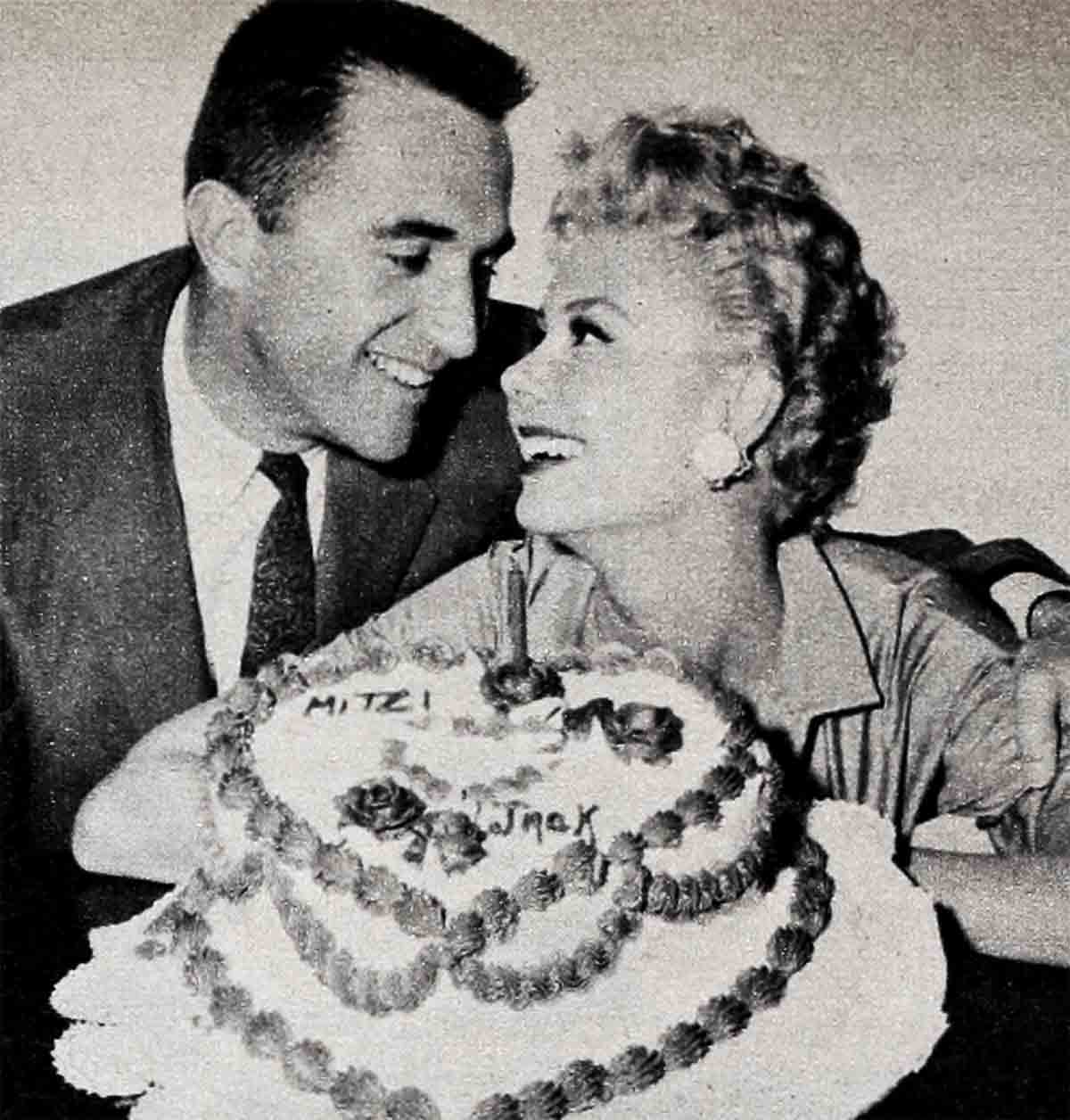
In the beginning, like so many brides, she was sure her cooking would utterly charm and delight Jack. Mitzi loves to prepare unusual and exciting dishes, many of which her parents taught her to make. But, she soon discovered, while Jack has a fine appetite, he’s apt to comment favorably about one of her exotic concoctions—then ask if they might have hamburger someday soon. Whenever they give a dinner party, Mitzi plunges into her preparations at 10 a.m. Hours later, when Jack comes home, he casually samples a little of everything in advance, and lets it go at that. So, to her own advantage, Mitzi has concluded that, as concerns Jack, cooking may not be a colossal asset, but at least it’s no handicap.
She’s realized, too, that a husband’s idea of a wonderful wife calls for more than welcoming warmth and soft kindness. A wife must also be good-natured, adaptable to his moods, and free of feminine fussiness. This new understanding has made Mitzi feel much freer.
However, before this, her outlook was a bit childish. For example, when Jack would come home at night, she would proudly fill his ear with all that had happened—good, bad or indifferent—during the day. Then gradually it began to dawn on her that a husband isn’t intrigued by the endless small details of a housewife’s day. She displayed her new-found wisdom one day after solving “the case of the streaked windows.” Jack had hardly noticed how awful they’d become, and the apartment superintendent had ignored her pleas that the panes be washed from the outside. Mitzi had considered getting ladder, pail and sponge and risking life and limb to do it herself. Eventually, she mustered up enough nerve to phone the “super” and tell him she was going to hire a man to wash the windows and would send the bill to the landlord. This paid off, and early the next morning a pleasant crew greeted her and gave the whole Bean residence a professional going-over.
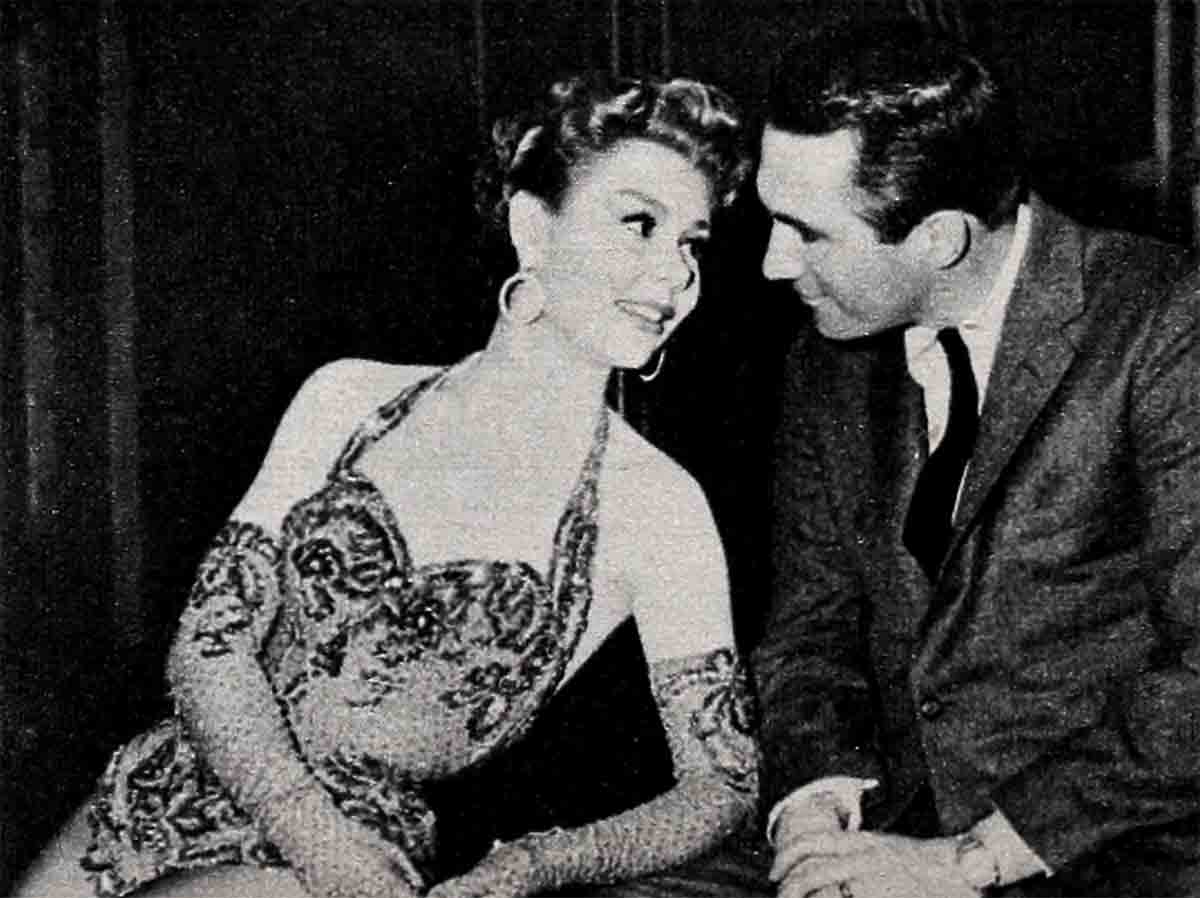
But that night, Mitzi hardly mentioned the matter to Jack. She merely asked him didn’t he think the flowers outside looked more vivid for some “odd” reason.
Heretofore, when Mitzi felt blue, she would hide her feelings and be miserable without anyone guessing. This, of course, led to a certain amount of frustration, and Jack (who has an M.A. in Psychology from USC) was eager for her to overcome this state of affairs. Now that she realizes Jack has complete faith in her, she’s no longer afraid to speak her mind and moods. She’s acting like an adult.
Tremendously conscientious, Mitzi also used to be superstitious about luck and, if anything ever went awry, she would be thrown into a panic. With great patience, Jack taught her to expect surprises or mishaps. Now she steels herself to meet any situation and can and does act like the capable woman Jack knows she is.
While being perpetually afraid used to make her a champion worrier, strangely enough, Mitzi never fretted about finances Until she became a star, her mother somehow managed to balance their budget. But when she hit the top, Mitzi became downright extravagant for a spell. She leased a stunning penthouse on the Sunset Strip, against her mother’s better judgment Then, she recalls, “Two weeks after Mother and I moved in, I went on a twelve-week lay-off. It took my savings and borrowing to pay the rent. I got out of there as soon as I could and was glad to be in a place that cost one-fourth as much.” Then, too, she adds, “When I met Jack, I had somehow signed with three agents and was obliged to pay commisions to all of them. That’s how skillful in business I was!
Because he can size up Mitzi’s offers so accurately, Jack has become her personal representative, although they still have need of a manager and a lawyer to carry out details. Now, however, Mitzi reads, and understands, all the fine print at the bottom of a contract. She also drives a Cadillac convertible—not only because it’s sleeker than a jalopy, but because the budget permits it.
“Last year,” she says, “I was still being coy when I wanted something our budget didn’t allow. Id rave to Jack about a terrific bargain I’d ‘accidentally’ seen advertised, and felt victorious when he nodded as I added to my wardrobe. Today, I don’t want to be that round-about. Sometimes I catch up by just not buying anything. Jack shrugs at this, calls it a silly shortcut—and I’m beginning to realize he’s right.”
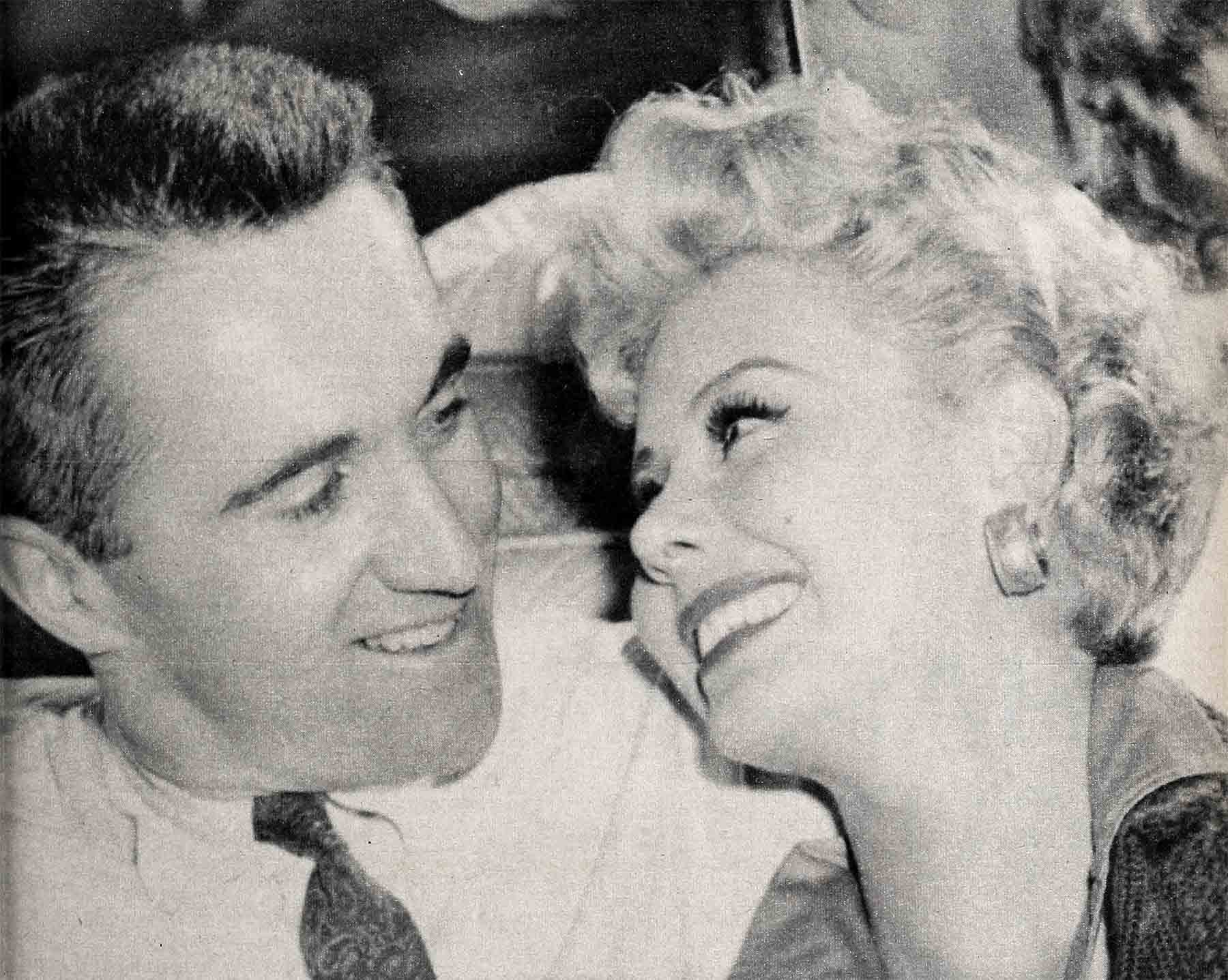
During their early wedded days, Mitzi also tried to be a femme fatale, to attract her husband anew each day. But her attempts at exuding an air of mystery and allure only resulted in weird silences, which at first made Jack think she was being aloof. Then he thought she might be sick and was appallingly curious about her health. After realizing she had been ill-advised to try this tactic, Mitzi went to the other extreme and put on her imp act. She’d often played the lovable imp in movies, but that isn’t what attracted Jack to her. He fell in love with her without ever seeing her in films, and he’s not the type to be fascinated by an impulsive beauty who’s mostly fluff.
“Every bride believes she has to flatter a man outrageously, and I was no exception,” Mitzi admits. “When Jack seemed to respond so satisfactorily, I dreaded becoming mentally lazy. But I was jarred out of that when he didn’t react to my flattery one day. ‘Now stop that stuff,’ he said. ‘You know it’s ridiculous!’ I was so astounded, all I could say was, ‘I do?’
“It’s a relief, though, to be beyond the merry little minx phase, to be able to be absolutely sincere.”
But even this hasn’t been a breeze. Mitzi is an extremist, so she temporarily became too frank and resolved to tell the whole truth. Which meant that, when she felt Jack was clearly wrong, she said so. He wasn’t exactly pleased by her utter straightforwardness—in fact, he was as mad as any outraged male. Finally, Mitzi retreated to the middle ground of tact, and since then they have loved each other even more, because of the subtle consideration they’ve shown one another.
Mitzi’s immaturity also showed when she thought she had to be cute to win a point in love. It was all a game to her, one she couldn’t bear to be bad at. But gradually her marriage has developed into the richly rewarding partnership of two sweethearts who are equals. She’s too fair to want to take advantage of Jack’s devotion. She knows now that mutual respect is one of their strongest ties, and her hopes for a full life with the one, right man for her are coming true. Truly, a great deal of womanly wisdom has crept into her big heart.
Since loving has taught her to be logical, Mitzi no longer becomes hysterical over every little reversal—which, of course, delights Jack. And there’s no doubt that her new poise and assurance have given her greater charm.
Mitzi has found this new awareness far more exhilarating and rewarding than any bride-like attitude of trying to fit a husband into a childishly preconceived pattern. Now, instead of hoping Jack will do and like what she wants, she revels in his striking individuality and tries to satisfy his particular needs. His problems are hers, and nothing is too much trouble.
It’s hard for Mitzi to believe now that she was so thoughtless the first time Jack depended on her to be ready to dine with him and a prospective client. She forgot all about it and was blithely cleaning house, when he rushed in, expecting her to be dressed and waiting. Nor does she get carried away too much by such things as romantic Hungarian fiddling. She used to weep openly when she heard it, and Jack called that “schmaltzy.” Mitzi’s father was a musical director and she was brought up on the classics.
“I can’t play anything myself,” she says, “but I never get my fill of symphonies and concertos.” She had five radios in their apartment, with music pouring out generously, until the day Jack reached over and snapped off the nearest one, saying he couldn’t read with music blaring. That anyone felt this way never occurred to Mitzi, so they compromised.
But then, while Jack was no symphony lover, she was oblivious to progressive jazz. “I was a square until Jack introduced me to it. He did it fast, on our first date. He whisked me to two little jazz spots in Los Angeles, and now I have my favorites in modern music, just as he does.”
When Jack drops in on her at the studio Mitzi has rock ’n’ roll on full blast, if she’s in. her rollicking mood. He shuts his eyes and gasps at anyone having that good a time at work! However, she still does the housework with opera flooding every room.
“Love puts you on your own,” Mitzi says. “At a job, you may not get a second chance. But in love there’s always an opportunity to show your love in a wiser way, and you learn you are on your own—that it’s up to you!”
She envies Jack’s solid convictions, his male belief that he’s right until, proven otherwise. “He’s always known what he wanted,” Mitzi says proudly, “and he says the way to get something is to go after it. I think it was terriffic that he was young when he was young, but was also so bright. At fourteen, in high school in Minneapolis, he decided to hire a huge dance hall and make some spending money. Minneapolis wasn’t on the circuit for big bands, but that didn’t bother Jack. He wrote directly to Count Basie, dickered with him, clinched the deal by phone. Then he sold admission tickets to 4500 people. When Basie and his men walked in, they kept inquiring nervously for the boy’s father. It never dawned on them that a boy had arranged the whole thing! It was such a clever idea, Jack did it again with Jimmy Lunceford’s band. Nothing can stop him!
“Me, I get nervous,” Mitzi laughs. “I’m so hypercritical of my attempts I’m apt to get all upset. I never feel I’ve given a good performance on the stage until I’ve played at least a dozen performances. I want to see every single movie, even the most dismal, for I might find out what not to do as well as what might be a step up.
“I don’t like to be branded bouncy now,” Mitzi discloses. And she isn’t any more. She’s a rare combination of curvaceous sex-appeal, sensitivity, hilarious humor, kindness and candidness—and she definitely doesn’t jiggle. Rather, she has such a superb stride you feel a band should strike up with “A Pretty Girl Is Like a Melody.”
Expressing her inner self is no longer difficult, either. “I’m curious about everything because I know knowledge is the key to many wonders. Jack’s habit of bringing me into wider ranges of a topic is so thoughtful! Who could be one-track around him? Yes,” she smiles, “I’ve changed into a questioner. Not just to be asking, or to be theatrical in another way, but because I really want to know why things tick as they do. I’m awe-struck by some of the answers I get.”
Mitzi is forever experimenting with re- arranging the apartment, because, “How can you ever give helpful instructions, if you don’t know how things should be done? Jack and I don’t know when we’ll go on to our first house. We’re glad we didn’t settle down in the one we thought we wanted before we married. It was elegant and comfortable, but now we see it wasn’t for us. We aren’t that restrained yet! We don’t want a ranch house, either—but something modern and citified. And with lots of closets! Our apartment makes us ache for space, and for a fireplace. When we’re older, we’d like to wind up in a French Regency home. ‘A more formal tomorrow,’ you might say, with sumptuous antiques! I’d rather,” she laughs, “have a house that’s graceful than one that’s purely functional. Meanwhile, this apartment has shown us we’re not dependent on material things for our happiness. It’s who you’re with, not where you are, that matters!”
Mitzi didn’t have to learn how to have exquisite taste, for she grew up with it and it’s one of the traits Jack admires most about her. The intelligent books she reads, the fresh flowers she likes around her, the paintings she is hanging on their walls, her personal graciousness—all mark her as a person of culture.
Mitzi is really one of the authentic glamour girls of this generation. She never slops about. Always feminine, her beauty is healthy and yet touched with the exotic. She is fond of stunning tailored suits, seductive hats with wisps of veiling, and gorgeous evening gowns. She prefers sit-down dinners to buffets because dressing up gives her a magnificent glow. Mitzi’s grateful she’s never had to coax Jack into a dinner jacket; he likes to dress appropriately. But she isn’t a slave to fashion, or to Jack. She is using her head now as he has wanted her to do, and the results show her own, strictly individual flair. “If the line looks good on me, I don’t care how uncomfortable the dress is!” She has a smart black fox stole which she wears instead of a coat whenever she can. “If someone asks me, ‘Aren’t you cold with just that stole?’ I answer, ‘No, I’m not’—and I’m not! When Jack takes too male a view, merely on general principles, and says, ‘You’re not wearing that ensemble, are you?’ I no longer run into the other room and burst into tears. I don’t assume our world will crack up. I want to please him more than anyone else, but husbands like spunk. So now I may grin and reply, ‘Yes, darling, I dare to be me!’ ”
Last November, the Beans celebrated their first wedding anniversary by pleasing each other as they truly are. Jack kissed Mitzi goodbye fondly that morning. She wondered about his sly smile after he departed. When he brought a particularly fetching package home, it was clear he’d been scheming. Opening it gleefully, Mitzi was ecstatic over the beautiful gold bracelet with a Roman numeral one dangling from a dainty chain she vows never to take off. And since they’re both mighty sentimental, when they merrily celebrate their golden wedding, she’ll be weighed down with the forty-nine numerals Jack will have undoubtedly added.
In turn, she surprised him with her gift, and he was delighted to find she’s become so practical. Jack had planned to buy a new topcoat when they returned to New York for their second honeymoon. Mitzi beat him to it by getting him a cashmere coat that thrilled him.
Mitzi could have invited a crowd of celebrities to help celebrate that evening, but there was no fancy fuss. You don’t have to be famous to be a friend of the Beans. This exceptional pair isn’t snobbish and, even if you don’t run into them for ages, you can pick up right where you left off. With their brand of loyalty, the Beans are the opposite of those who have many acquaintances and few friends.
On their anniversary night, two of Jack’s bachelor buddies wanted to be the Beans’ hosts. Sam Lawrence, who is in stocks and bonds, and Jim Raskin, who is in the lumber business, and their dates escorted Mitzi and Jack to a gala dinner at Chasen’s, and then on to Ciro’s. The six of them were thoroughly in tune, for Mitzi fitted into the group marvelously. She no longer tries to be the center of attention; love has taught her to mix well. Before she was married, she used to take over as the life of the party, chattering on and on with an adolescent authority she now calls absurd. “When you feel you have to talk so much in order to make others know you’re present,” she quips, “you certainly can’t listen—and I’d rather listen and learn something new!”
Several days later, Mitzi and Jack flew to Manhattan for a less hectic second honeymoon. They’d had to sit up cross-country to get there on their wedding night, were drenched by a storm when they landed,then got on a non-stop merry-go-round of activities. This time, they didn’t stay in a hotel where the lobby is crowded, but high up in Hampshire House in a spacious suite. Mitzi is an earnest student of the theatre, so they bought tickets for every Broadway hit. Lazy, late rising, leisurely lunching and dining in the smart restaurants, going on gayly afterwards to their favorite midnight spots, catching up with nearly everyone they longed to see, made their vacation all they’d wanted it to be. When they got home they felt refreshed and invigorated.
Recalling her previous whirlwind life, Mitzi says, “When I got into pictures I was so naive I’d have jumped off the Empire State Building if they’d provided a tiny pillow on the street below. Now—well, I’d hesitate! I can finally see that Hollywood isn’t a fairy-tale land, that working in pictures is tiring as well as fun. You can’t live an uncomplicated life here, and you must be cautious because every action and remark is exaggerated. Still, by patience and by planning you can attain your goals; they don’t have to be vague rainbows. Jack has inspired me to concentrate on one objective at a time instead of half-a-dozen, and he’s proved there always is time for whatever should be done.”
As soon as she developed the courage to sally forth on her own, Mitzi secured her release from the long-term contract which had limited her to too many second-best roles. Now that she is able to make her own choice from the offers she receives, she’s been going great guns.
Starring in Paramount’s great new musical, “Anything Goes,” has led to close friendships with Bing Crosby, Donald O’Connor and Jeanmaire. Bing gave her a bicycle, and between scenes taught her how to ride it. Donald presented her with a case of chewing gum, because she chews constantly while practicing her elaborate dance numbers. Jeanmaire (Zizi to the gang) was precisely the perfectionist Mitzi expected one of the most accomplished ballerinas to be, and they got along wonderfully. Then, too, Mitzi had the A-1 guidance of Director Robert Lewis, one of Broadway’s stage geniuses.
When George Gobel asked her to co-star with him in his first movie, “The Birds and The Bees,” the switch to playing comedy opposite him was just the contrast Mitzi craved. And she was additionally delighted when David Niven, a number-one performer and friend in her book, was cast with them.
Mitzi has also received a number of tempting Broadway bids, which she greatly appreciates. After all, she got into movies by scoring during her teens in West Coast operettas, and she yearns to sing and dance on Broadway someday—in the right shows. “An Evening with Mitzi Gaynor” is a good possibility, since her theatrical talents are boundless. She could also write her own ticket in television. But, mapping out her plans for this year, Mitzi puts movies first. Broadway, TV and all else will have to wait. However, don’t think that she and Jack will become so engrossed in their work that their zest for life will suffer.
“I hope to have two new movies finished by the end of July,” says Mitzi. “Then Jack and I want to go to Europe from August till almost Christmas. We have the travel bug—but bad! I’ve never been across an ocean, so you can imagine how the prospect lures me! Mention any place over there and I want to go see where history happened. Jack was in Europe during the war, so there’s so much he can show me. I recall how I spent so many Sundays when I was in grade school in Detroit. For four or five years my girlfriends and I wandered through the Art Institute there regularly. We’d take sandwiches and eat our lunch sitting on the cement benches inside. I want to see the art in Europe, as well as the theatres, opera, ballet, the different customs, the breathtaking architecture and scenery and the people!” she says excitedly. “We aren’t going on a strict schedule, won’t be tied down in tourist traps. We’ll roam—drive and bicycle around.”
Obviously, Jack’s adventurous streak appeals to high-spirited Mitzi, and they’ll explore with enormous gusto. The vividness of Venice will especially appeal to her for there’s nothing lukewarm about her: Mitzi will be magnificent in a gondola—or wherever else Jack takes her!
Today this luscious twenty-four-year-old is a young lady no longer in a lather. She has sterling values she doesn’t forget For “Anything Goes,” she spent two weeks rehearsing, and more than a week shooting the spectacular dance routine she does with Donald O’Connor, supposedly on the upper deck of the Liberté en route from France. Then, in “The Birds and The Bees,” George Gobel makes his song-and-dance debut in a zippy pairing with Mitzi on, presumably, the top deck of another ocean liner. No wonder Jack gulps when he wonders if he’ll be swept into an impromptu song and dance when the Beans hit the deck of the boat they want to take this summer. “Come on,” Mitzi will probably challenge him. “This time it’s for real!”
THE END
It is a quote. PHOTOPLAY MAGAZINE MAY 1956




